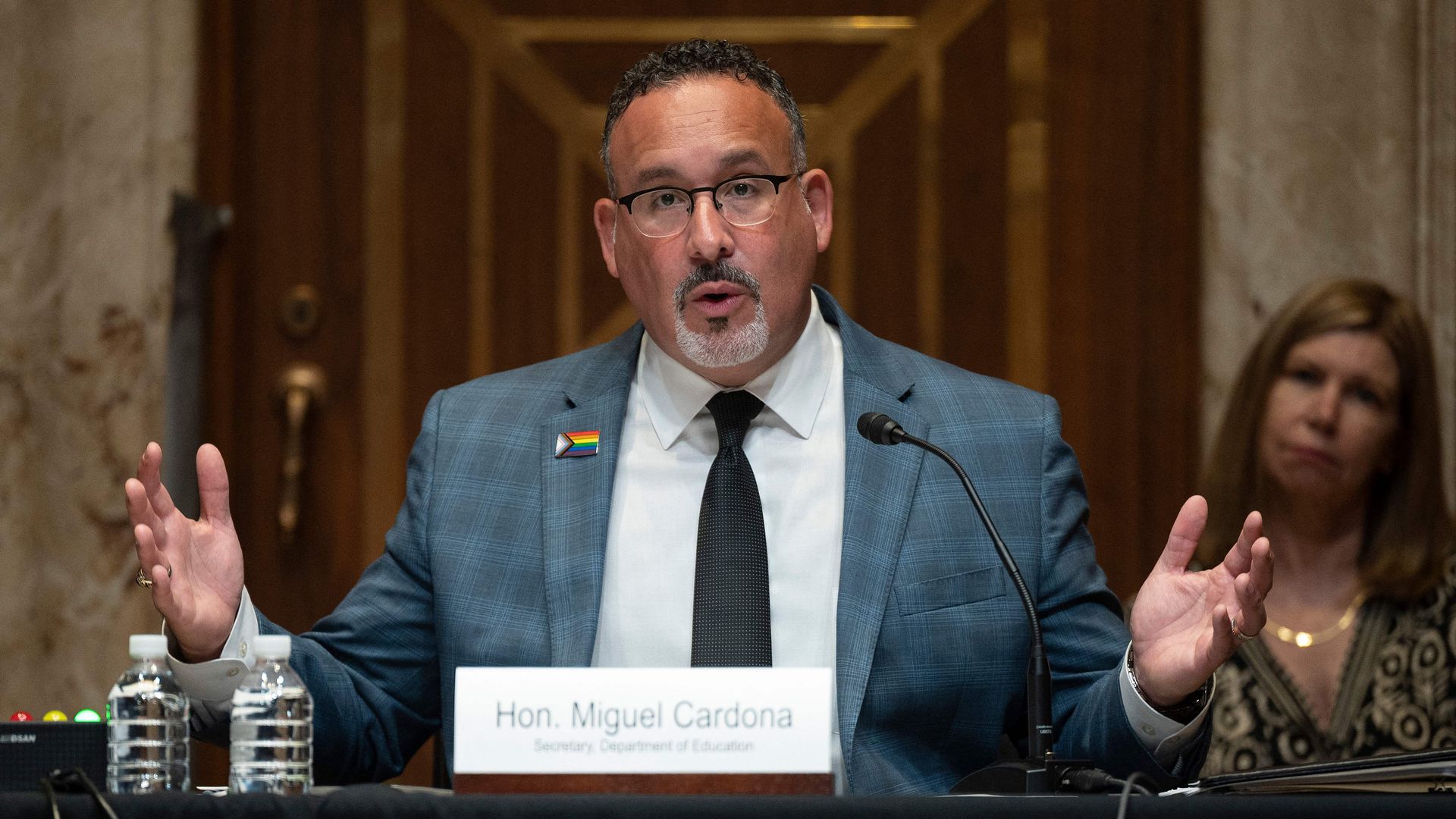| | | | | | | Presented By Amazon | | | | Axios Sneak Peek | | By Alayna Treene and Hans Nichols ·Jul 11, 2021 | | Welcome back to Sneak. We had a great Fourth and hope you did, too. ⚡ Situational awareness: Sen. Rand Paul (R-Ky.) has sent a letter to the head of the National Security Agency, requesting an investigation into allegations it spied on Tucker Carlson, Axios' Sarah Mucha reported this evening. Smart Brevity™ count: 1,269 words ... 5 minutes. Edited by Glen Johnson. | | | | | | 1 big thing: Bernie bows to reality |  | | | Sen. Bernie Sanders during an outdoor protest last month. Photo: Saul Loeb/AFP via Getty Images | | | | Key negotiators expect the Senate Budget Committee to settle on a roughly $3.5 trillion reconciliation package as the starting point for a Democrat-only bill for "soft" infrastructure, people familiar with the matter tell Axios' Hans Nichols. Why it matters: That total is well below the $6 trillion that Sen. Bernie Sanders — the Vermont independent who leads the committee — had initially proposed. Adopting it would be a blow to his fellow progressives. - The emerging agreement will, however, cover all of the major Biden administration proposals on soft infrastructure, including the president's families, climate and housing programs, according to a source familiar with the Senate budget resolution discussions.
- While negotiators are still finalizing details, the proposal is close to fully offset with new revenues, among other pay-fors.
- The roughly $3.5 trillion could get shaved down further once the full Senate — including centrists like Sens. Joe Manchin (D- W.Va.), Kyrsten Sinema (D-Ariz.) and Jon Tester (D-Mont.) — extract their own demands.
- The package will need the support of every Democrat on the Senate floor to pass.
Driving the news: Sanders is still pushing for a high number, telling the New York Times' Maureen Dowd for an interview published today that $2 trillion to $3 trillion is "much too low." - Sanders will have to convince centrists on the committee such as Sen. Mark Warner (D-Va.), who hasn't revealed his top-line number is but privately suggested it's more in the $3- to $4-trillion range.
- After two weeks of staff negotiations, senators on the Budget Committee are expected to meet tomorrow evening to try to bridge differences on the total size of the package and how much of it needs to be paid with new revenues.
The big picture: Senate Majority Leader Chuck Schumer (D-N.Y.) has declared he wants the budget resolution and the bipartisan infrastructure package both to pass the full Senate before senators leave for their August recess. - That timeline will put pressure on senators worried about having some of their recess canceled, which could complicate lawmakers' fundraising plans.
Go deeper: Revenues are emerging as a key dividing line within the Democratic caucus, with centrists like Manchin saying new spending will have to be paid for with new taxes. - Other centrists are uncomfortable with raising taxes on corporations, capital gains and personal income too high, which in turn puts a ceiling on any new spending.
Between the lines: The White House is taking a wait-and-see approach and wants to give Senate Democrats the space to compromise. - House centrists have no interest in voting for anything that can't pass the Senate, including tax increases, putting most of the action in the Senate.
|     | | | | | | 2. Racing Schumer's clock |  | | | Illustration: Annelise Capossela/Axios | | | | Senators face a massive squeeze for passing the infrastructure packages by the deadlines set by the White House and Schumer, Axios' Alayna Treene writes. Why it matters: They return tomorrow for their final four-week sprint until August recess. The bipartisan group that reached a framework with the White House before the July Fourth recess is still working on its bill, as Hans noted, and the reconciliation bill also hasn't been written. - In addition, Schumer and House Speaker Nancy Pelosi (D-Calif.) haven't blinked on Senate Minority Leader Mitch McConnell's demand that they delink the "soft" infrastructure package from the bipartisan one.
What we're hearing: Most Democratic senators in the bipartisan group care far less than leadership about process and sequencing. Once they have the necessary votes, they want to move on the centrist bill. - But progressives, particularly those in the House, have continued leveling threats they'll oppose that legislation unless the more ambitious reconciliation package passes with it.
- Meanwhile, it's still not clear whether McConnell will support the bipartisan package. His comments over July Fourth were intentionally vague, Senate aides say, as he waits to see what the final legislation will look like — and how Schumer and Pelosi plan to push it forward.
State of play: In a letter to his caucus last week, Schumer made clear he wants the Senate to consider both packages during the upcoming work period. However, he did not use specific language about tying them together. - Instead, he relied on technical language to say he wanted to pass "a budget resolution with reconciliation instructions, which is the first step for passing legislation through the reconciliation process."
- The bipartisan group — now made up of 22 senators with Sen. Jacky Rosen (D-Nev.) signing onto the deal last week — has been in constant touch over recess about minute details of the package, which their staffs are currently drafting.
Be smart: This is just considering the Senate. The House doesn't return to the Capitol for another week, and its members are scheduled to jet back home for August recess two weeks later. |     | | | | | | 3. By the numbers: Troop levels in Afghanistan |  Data: Brookings Institution; Chart: Sara Wise/Axios President Biden announced last week the mission in Afghanistan will end by Aug. 31 — closing out the longest war in U.S. history. By the numbers: Troop levels have already fallen from a peak in 2010 and 2011, when there was an annual average of 90,000 U.S. personnel in Afghanistan, according to a study by the Brookings Institution reviewed by Axios' Stef Kight. From Pearl Harbor through D-Day, there was an average of 7.7 million U.S. military personnel involved in World War II. - As of 2019, U.S. troops in Afghanistan totaled 8,500. Now, the U.S. withdrawal is already more than 90% complete.
- More than 2,300 U.S. troops have died in Operation Enduring Freedom since 2001, according to Department of Defense data.
- Tens of thousands of Afghan civilians also have been killed.
|     | | | | | | A message from Amazon | | See what making $15+/hr means to Amazon employees | | |  | | | | Before working at Amazon, Leonardo was making $9 an hour at a car wash. Now he makes more than $15 an hour and is able to help his family. What this means: Amazon employees have seen the difference that making at least $15 an hour can have. Get more details. | | | | | | 4. First look: Education secretary takes field trip |  | | | Education Secretary Miguel Cardona. Photo: Jim Watson/AFP via Getty Images | | | | Education Secretary Miguel Cardona is taking a cross-country tour to visit schools and community colleges preparing for full reopenings this fall, Axios' Sarah Mucha has learned. Why it matters: School closings and remote learning were big flashpoints throughout the pandemic. The administration wants to tout the American Rescue Plan, which is pumping at least $122 billion into learning and student and teacher safety, and the trip follows new guidance from the CDC urging the full reopenings. - As part of the weeklong travel blitz, the secretary will visit several summer learning programs bringing students back to the classroom — or outdoors, for the time being — as test runs for the fall.
- The travel follows the president's own visit to a community college and children's learning center in Illinois last week.
The details: Cardona is heading this week to North Carolina, Oregon, California and New Jersey, a source familiar with his plans said. - In North Carolina, he and Rep. Alma Adams (D-N.C.) will visit an HBCU and summer learning program supporting students with disabilities.
- In Oregon, Cardona will hold a roundtable with Rep. Suzanne Bonamici (D-Ore.) to discuss the president's pledge to publicly fund two years of community college.
- In California, he'll participate in a field day event. It's meant to amplify summer enrichment opportunities designed to re-engage students after their long period of remote learning.
- And in New Jersey, he and Rep. Donald Norcross (D-N.J.) will visit a community center to meet students participating in summer programming. They'll discuss administration efforts to help students at risk of dropping out or falling behind long-term.
Go deeper: Cardona has yet to weigh in about whether schools should make vaccines a requirement for those students who are age-eligible. Currently, those 12 and above are encouraged to receive a COVID-19 vaccine. - Asked last week by ABC News, Cardona dodged, saying, "The resources are there, the science is there. We need to do our part to make sure students go in person every day in the fall."
- The CDC's new guidance stresses the return of in-person learning.
|     | | | | | | 5. Tweet du jour |  | | | Via Twitter | | | | Devotees of Southern politics appreciate the rich backstory to this Twitpic. |     | | | | | | A message from Amazon | | Independent study: Spillover effects of Amazon's wage increase | | |  | | | | New research shows that Amazon's wage increase to $15 an hour directly benefited wages for other non-Amazon workers in those communities. The report also found that their increase of wages to $15 did not result in widespread job loss. Learn more. | | | | 📬 Thanks for starting your week with us. A reminder your family, friends and colleagues can subscribe to this or any of Axios' other free newsletters by clicking here. |  | | It'll help you deliver employee communications more effectively. | | | | | | Axios thanks our partners for supporting our newsletters. If you're interested in advertising, learn more here.
Sponsorship has no influence on editorial content. Axios, 3100 Clarendon Blvd, Suite 1300, Arlington VA 22201 | | | You received this email because you signed up for newsletters from Axios.
Change your preferences or unsubscribe here. | | | Was this email forwarded to you?
Sign up now to get Axios in your inbox. | | | | Follow Axios on social media:    | | | | | |










No comments:
Post a Comment